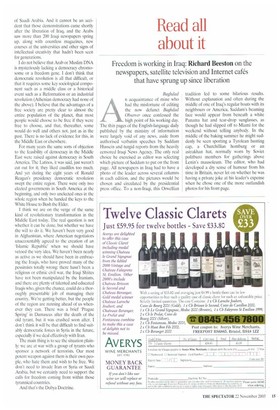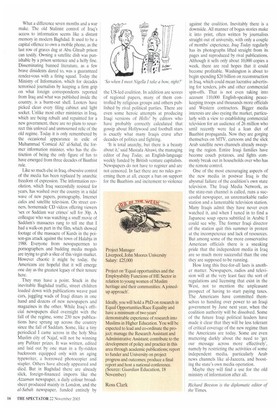Read all
about it
Freedom is working in Iraq: Richard Beeston on the newspapers, satellite television and Internet cafés that have sprung up since liberation
Baghdad
An acquaintance of mine who had the misfortune of editing the now defunct Baghdad Observer once confessed the high point of his working day. The thin pages of the English-language daily published by the ministry of information were largely void of any news, aside from authorised verbatim speeches by Saddam Hussein and turgid reports from the heavily censored Iraqi News Agency. The only real choice he exercised as editor was selecting which picture of Saddam to put on the front page. All newspapers in Iraq had to have a photo of the leader across several columns in each edition, and the pictures would be chosen and circulated by the presidential press office. To a non-Iraqi, this Orwellian
tradition led to some hilarious results. Without explanation and often during the middle of one of Iraq's regular bouts with its neighbours or America, Saddam's beaming face would appear from beneath a white Panama hat and tear-drop sunglasses, as though he had slipped off to Miami for the weekend without telling anybody. In the middle of the baking summer he might suddenly be seen sporting a Tyrolean hunting cap, a Churchillian homburg or an astrakhan hat, normally worn by Soviet politburo members for gatherings above Lenin's mausoleum. The editor, who had developed a dry sense of humour from his time in Britain, never let on whether he was having a private joke at his leader's expense when he chose one of the more outlandish photos for his front page. What a difference seven months and a war make. The old Stalinist control of Iraq's access to information seems like a distant memory in modern Baghdad. It used to be a capital offence to own a mobile phone, as the last row of graves dug at Abu Ghraib prison can testify. Owning a satellite dish was punishable by a prison sentence and a hefty fine. Disseminating banned literature, as a few brave dissidents dared to, was a guaranteed rendez-vous with a firing squad. Today the Ministry of Information, which for decades terrorised journalists by keeping a firm grip on what foreign correspondents reported from Iraq and what was published inside the country, is a burnt-out shell. Looters have picked clean every filing cabinet and light socket. Unlike most other ministries in Iraq, which are being rebuilt and repainted for a new government, there are no plans to resurrect this unloved and unmourned relic of the old regime. Today it is only remembered by the occasional appearance in exile of Muhammad 'Comical Ali' al-Sahaf, the former information minister, who has the distinction of being the only figure of fun to have emerged from three decades of Baathist rule.
Like so much else in Iraq, obsessive control of the media has been replaced by anarchic freedom of expression. The information revolution, which Iraq successfully resisted for years, has washed over the country in a tidal wave of new papers, pornography, Internet cafes and satellite television. On street corners, homemade CD videos offering viewers 'sex or Saddam war crimes' sell for 30p. A colleague who was watching a snuff movie of Saddam's massacres rang to tell me that I had a walk-on part in the film, which showed footage of the massacre of Kurds in the poison-gas attack against the town of Halabja in 1988. Everyone from newspapermen to pornographers and budding media moguls are trying to grab a slice of this virgin market. However chaotic it might be today, the Americans are hopeful that it will emerge one day as the greatest legacy of their tenure here.
They may have a point. Stuck in the inevitable Baghdad traffic, street children loaded down with publications weave past cars, juggling wads of Iraqi dinars in one hand and dozens of new newspapers and magazines in the other. While Iraq's official newspapers died overnight with the fall of the regime, some 230 new publications have sprung up across the country since the fall of Saddam. Some, like a tiny periodical I came across in the holy Shia Muslim city of Najaf, will not be winning any Pulitzer prizes. It was written, edited and laid out by one man in a fly-ridden backroom equipped only with an aging typewriter, a borrowed photocopier and stapler. Others have already appeared and died. But in Baghdad there are already slick, foreign-financed imports like the Azzaman newspaper, a daily colour broadsheet produced mainly in London, and the al-Sabah newspaper, funded entirely by the US-led coalition. In addition are scores of regional papers, many of them controlled by religious groups and others published by rival political parties. There are even some heroic attempts at producing Iraqi versions of Hello! by editors who have probably correctly calculated that gossip about Hollywood and football stars is exactly what many Iraqis crave after decades of politics and fighting.
'It is total anarchy, but there is a beauty about it,' said Mustafa Alrawi, the managing editor of Iraq Today. an English-language weekly funded by British venture capitalists. Newspapers do not have to register and are not censored. In fact there are no rules governing them at all, except a ban on support for the Baathists and incitement to violence against the coalition. Inevitably there is a downside. All manner of bogus stories make it into print, often written by journalists straight out of university, with only a couple of months' experience. Iraq Today regularly has its photographs lifted straight from its pages and reproduced by rival publications. Although it sells only about 10,000 copies a week, there are real hopes that it could become profitable. Washington is about to begin spending $20 billion on reconstruction in Iraq, which could mean lucrative advertising for tenders, jobs and other commercial spin-offs. That is not even taking into account 110,000 English-speaking peacekeeping troops and thousands more officials and Western contractors. Bigger media interests are also eyeing the market, particularly with a view to establishing commercial television for an audience of 26 million who until recently were fed a lean diet of Baathist propaganda. Now they are gorging themselves on MTV, cartoons and the slick Arab satellite news channels already sweeping the region. Entire Iraqi families have become couch potatoes, and fights commonly break out in households over who has the remote control.
One of the most encouraging aspects of the new media in postwar Iraq is the abysmal failure of the coalition's own state television. The Iraqi Media Network, as the state-run channel is called, runs a successful newspaper, an unremarkable radio station and a lamentable television station. Many Iraqis admit they have never even watched it, and when I tuned in to find a Japanese soap opera subtitled in Arabic I could see why. The former Iraqi director of the station quit this summer in protest at the incompetence and lack of resources. But among some of the more conservative American officials there is a sneaking pride that the independent media in Iraq are so much more successful than the one they are supposed to be running.
How long this free-for-all lasts is another matter. Newspapers, radios and television will at the very least face the sort of regulations and licensing that exist in the West, not to mention the unpleasant prospect of having to start paying taxes. The Americans have committed themselves to handing over power to an Iraqi government by June next year, when the coalition authority will be dissolved. Some of the future Iraqi political leaders have made it clear that they will be less tolerant of critical coverage of the new regime than the Americans are today. Some are even muttering darkly about the need to 'get our message across more effectively', namely by restricting the activities of some independent media, particularly Arab news channels like al-Jazeera, and boosting the state's own media operation.
Maybe they will find a use for the old ministry of information after all.



























































































 Previous page
Previous page